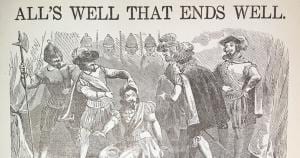We do not, of course, always know what is good for us.
 Our choices tend to be for what we think we want instead of what we need: our heart’s truest longing. If we go for what we think we want, life will not end well. If we find the absolute desire of our heart, and move with all our strength and God’s good mercy toward that bliss, then all will be well in the end.
Our choices tend to be for what we think we want instead of what we need: our heart’s truest longing. If we go for what we think we want, life will not end well. If we find the absolute desire of our heart, and move with all our strength and God’s good mercy toward that bliss, then all will be well in the end.
Our choices foretell certain ends, even the best of us needing grace and mercy. Shakespeare understood the need for mercy that many of us have. He reminds us that God keeps working in us and that the end counts: All’s Well that Ends Well.
Life ends in death, so far as we can see. Hope suggests that, mayhap, there is more and we can live again. Hope looks to an eternity where every pain will be given meaning in the context of goodness. Those we miss will be met again. Reflecting in hope, we study, we live, we discuss, and during the process, the truth begins to be revealed. We find faith more substantial intellectually and emotionally than hope. We never end up with surety of our fondest desires, but gain good reason to think death is not the end. So Shakespeare can begin:
Moderate lamentation is the right of the dead, excessive grief the enemy to the living.
This reflection on death at the start of the action seems odd in a comedy, one of the last pure comedies Shakespeare wrote. A comedy has a happy ending and Shakespeare agrees with the Greeks that one cannot call a man happy until he is dead. As a Christian, he goes further and will not call a man happy (blessed!) until he sees what he needs, really needs, and not just what he wants: grace and mercy to end well.
We lament the dead, they have earned our grief by their good lives, yet to fixate on our sorrow will turn our lives into a living death. Our houses cannot become shrines, our lives memorials. We move forward toward where they have gone, lamenting their end, but moderately.
Why?
We must make our own good end and excessive grief will keep us from that project. We are, all of us, headed to the end of the “play” and that end can produce either a tragedy (ask Macbeth) or comedy. All’s Well begins with a sick King and missing parents, taken by death.
The “hero” of the play, the hapless Bertram, is headed in the wrong direction. He should love Helena, is blessed Helena loves him, but his social snobbery blinds him to her graces. She is grace to him and just what he needs. Bertram, however, wants what he should not have, trusts the wrong people, and in general makes an ass of himself. Fortunately, Helena is clever, and in this fairy tale, wins her prince-not-so-charming by meeting his every challenge and causing him, at last, to see that he loves her, needs her, and has no future without her.
The play does not end as much as point to the possibility of a happy ending. If all do as they should as they say they will, then all’s well, because life will end well. Helena gains the title of nobility that matches the nobility in her soul and Bertram has hope of transformation. They will marry, raise their child, and come to a good end. Still, Bertram’s repentance might be shallow and so we are left a bit uncertain. We are hopeful, with faith in any project Helena begins, but unsure of Bertram. He may make a good end after a bad beginning.
Maybe.
Moderate hope is the right of the living, excessive certainty the enemy of a noble death.












